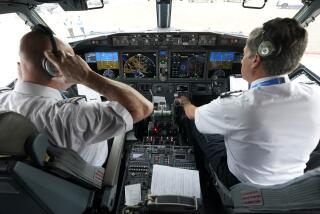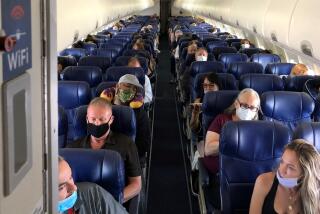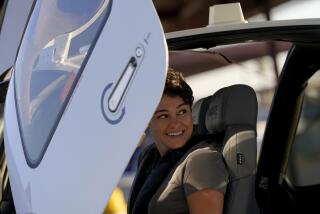Testing of Pilots, Crew Being Studied by FAA
- Share via
When you fly your life is in the hands of the pilots, and great care is taken to see that the pilots are in good shape and able to perform their duties.
Pilots and co-pilots even eat different foods during the flight so that if one suffers from a culinary problem, the other can still handle the flight.
Passing biannual medical exams is another requirement made of commercial airline pilots, who must retire at the age of 60. This medical exam has to be conducted by an FAA-approved doctor. A pilot who fails this exam would have to appeal to the FAA air surgeon to seek a special certificate to keep flying. According to the FAA, in 1985 there were 1,287 such requests, with 959 approved.
We live in a society where drug use is an issue, and accordingly, the FAA is asking for public comment on possible measures to combat drug and alcohol use by airline pilots and by others in the aviation industry.
Eight-Hour Rule
Currently, pilots, flight attendants, flight engineers and navigators may not act as crew members within eight hours after drinking or using a drug that adversely affects their faculties. While the FAA imposes this regulation, it’s up to the airlines to enforce it, an FAA spokesperson said.
There are no systematic checkpoints that these personnel go through before a flight, nor are there random spot-checks of crews. Crew members reporting for flights are seen by other members of the airline. For the most part, the FAA and the airlines depend on observation by others of the flight crew and the good sense of the personnel themselves. “It takes someone to blow the whistle, unless the person involved turns himself or herself in,” said an FAA spokesperson. “After all, their lives are at stake, too.”
Dick Russell, safety coordinator for the Los Angeles chapter of the Air Lines Pilot Assn., said: “Airline personnel will report on their own people. Their safety is obviously involved. I’ve seen pilots terminated for drinking within the prescribed period and for showing up at the airport in unfit condition. You can’t look or act under the influence.”
Barbara Feuer, director of the employee assistance program for the Assn. of Flight Attendants in Washington, D.C., agreed. “If flight attendants are unfit for duty, they are told to remove themselves from duty and in almost all cases this is sufficient,” she said.
Other Personnel
Airlines generally have personnel on standby or ready reserve who can take over for someone who is sick or otherwise unable to work that flight, Russell said.
However, the FAA does recognize the probability of individuals who are “enablers,” who tolerate or cover for a person with a drug or alcohol problem, especially if loss of a job is involved.
Among the possible measures being explored by the FAA are scheduled and random drug-testing, pre-employment screening, prohibition of off-duty drug use, employee assistance and rehabilitation programs for substance abusers.
Other questions being raised for response are whether employers can test employees on “reasonable suspicion” of use of intoxicants and what categories of airline employees and other FAA-regulated individuals should be covered. Examples of FAA-regulated personnel include aircraft dispatchers, mechanics and repairmen.
The inquiry also covers what actions should be taken by the FAA in the case of drug- or alcohol-related motor vehicle offenses by pilots or other personnel.
Accuracy an Issue
“While we’re very much in favor of anything that improves air safety, we’re unalterably opposed to random or scheduled drug testing until such tests are much more accurate than they are now,” Russell said. “Careers are at stake when such tests are given. Even if the test results are negative, there can be a stigma attached.”
From the flight attendant’s perspective, Feuer said: “Drugs are a serious problem in our society but we’re against random or scheduled testing because it’s an invasion of privacy and innocent people can be victimized. Testing for reasonable suspicion is OK, but we question what is probable cause and who makes that decision? There are so many variables possible--like someone having an adverse reaction to medications, suffering from a loss of sleep due to marital or comparable problems, etc. Are supervisors trained to recognize these problems?
“Tests for drugs just show that you ingested some drug. It doesn’t tell you in what amount and even more important whether or not there is any job impairment involved,” she said.
A Catch-22
Russell pointed out a Catch-22 situation where pilots are involved. “The FAA says a pilot shouldn’t fly with a cold, but airlines have rules about how often a pilot can call in sick, and if you go over that number you can be called in for counseling and face possible termination for unreliability. Some pilots then take an over-the-counter nasal decongestant, Sudafed, which they’re permitted to use but which has been reported as possibly being mistaken for marijuana in the blood in current drug testing.”
Flight attendants, Feuer said, face a similar problem. “There is a temptation to fly even if you don’t feel well. The best control mechanism is implementation of a viable employee assistance program requiring confidentiality and without the risk of losing your job because you seek help.”
Commercial pilots, Russell said, already receive at least two medical examinations a year, each of which would indicate drug or alcohol abuse. “Pilots are closely monitored, and this is a much bigger problem with general aviation,” Russell charged.
On the other hand, Russell indicated that the Pilots’ Assn. supports pre-employment screening and the right of airlines to test employees if there is reasonable suspicion of drug or alcohol abuse.
Send your comments to the FAA, Docket 25148, 800 Independence Ave. S.W., Washington, D.C. 20591.
More to Read
Sign up for Essential California
The most important California stories and recommendations in your inbox every morning.
You may occasionally receive promotional content from the Los Angeles Times.













